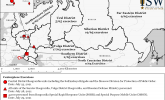Russian National Guard (Rosgvardia) Demonstrates New Capabilities in First-Ever Strategic Exercise
August 17, 2021 - ISW Press
The Russian National Guard (Rosgvardia) demonstrated new capabilities and readiness during its first-ever operational-strategic exercise from July 12 to 30. Rosgvardia conducted Zaslon-2021 as a nationwide exercise and readiness check of its full spectrum of capabilities, not a localized exercise as it originally claimed. Rosgvardia falsely announced in early July that Zaslon-2021, its first strategic exercise since its establishment in 2016, would occur only in the Central, Volga, and Southern federal districts and support preparations for the Russian military’s upcoming Zapad-2021 exercise. Zaslon-2021 instead occurred simultaneously in every Russian federal district except the North Caucasian. Rosgvardia conducted four large-scale exercises involving all Rosgvardia units in the announced Central, Volga, and Southern districts, supported by unannounced small-scale exercises across Russia. Twenty-three of Zaslon’s component exercises occurred in the announced districts, while 42 exercises occurred in other, unannounced districts across Russia.







